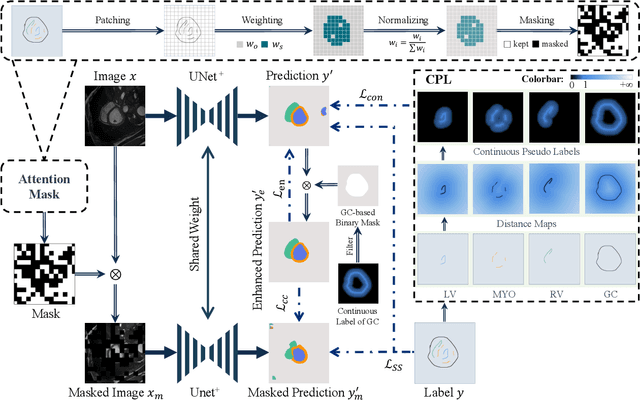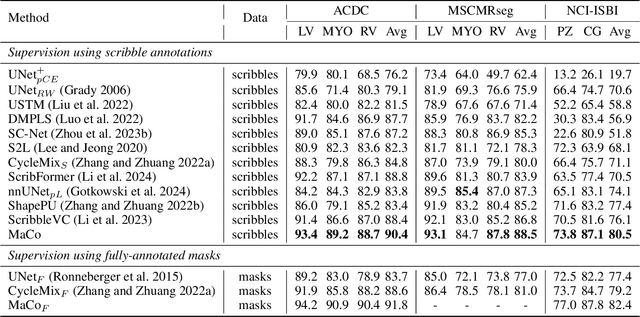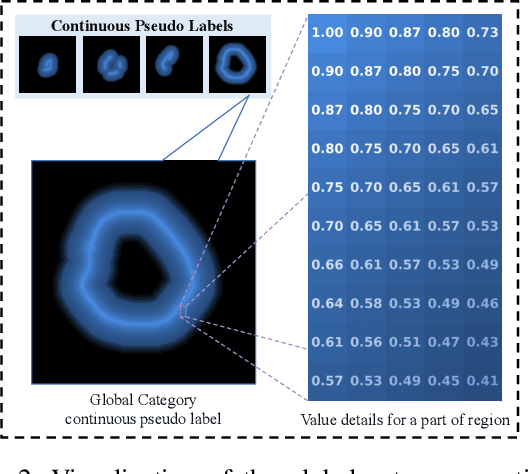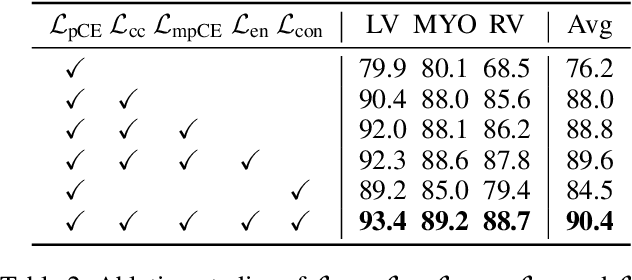Zhisong Wang
Enjoying Information Dividend: Gaze Track-based Medical Weakly Supervised Segmentation
May 28, 2025Abstract:Weakly supervised semantic segmentation (WSSS) in medical imaging struggles with effectively using sparse annotations. One promising direction for WSSS leverages gaze annotations, captured via eye trackers that record regions of interest during diagnostic procedures. However, existing gaze-based methods, such as GazeMedSeg, do not fully exploit the rich information embedded in gaze data. In this paper, we propose GradTrack, a framework that utilizes physicians' gaze track, including fixation points, durations, and temporal order, to enhance WSSS performance. GradTrack comprises two key components: Gaze Track Map Generation and Track Attention, which collaboratively enable progressive feature refinement through multi-level gaze supervision during the decoding process. Experiments on the Kvasir-SEG and NCI-ISBI datasets demonstrate that GradTrack consistently outperforms existing gaze-based methods, achieving Dice score improvements of 3.21\% and 2.61\%, respectively. Moreover, GradTrack significantly narrows the performance gap with fully supervised models such as nnUNet.
CoSAM: Self-Correcting SAM for Domain Generalization in 2D Medical Image Segmentation
Nov 15, 2024



Abstract:Medical images often exhibit distribution shifts due to variations in imaging protocols and scanners across different medical centers. Domain Generalization (DG) methods aim to train models on source domains that can generalize to unseen target domains. Recently, the segment anything model (SAM) has demonstrated strong generalization capabilities due to its prompt-based design, and has gained significant attention in image segmentation tasks. Existing SAM-based approaches attempt to address the need for manual prompts by introducing prompt generators that automatically generate these prompts. However, we argue that auto-generated prompts may not be sufficiently accurate under distribution shifts, potentially leading to incorrect predictions that still require manual verification and correction by clinicians. To address this challenge, we propose a method for 2D medical image segmentation called Self-Correcting SAM (CoSAM). Our approach begins by generating coarse masks using SAM in a prompt-free manner, providing prior prompts for the subsequent stages, and eliminating the need for prompt generators. To automatically refine these coarse masks, we introduce a generalized error decoder that simulates the correction process typically performed by clinicians. Furthermore, we generate diverse prompts as feedback based on the corrected masks, which are used to iteratively refine the predictions within a self-correcting loop, enhancing the generalization performance of our model. Extensive experiments on two medical image segmentation benchmarks across multiple scenarios demonstrate the superiority of CoSAM over state-of-the-art SAM-based methods.
From Few to More: Scribble-based Medical Image Segmentation via Masked Context Modeling and Continuous Pseudo Labels
Aug 23, 2024



Abstract:Scribble-based weakly supervised segmentation techniques offer comparable performance to fully supervised methods while significantly reducing annotation costs, making them an appealing alternative. Existing methods often rely on auxiliary tasks to enforce semantic consistency and use hard pseudo labels for supervision. However, these methods often overlook the unique requirements of models trained with sparse annotations. Since the model must predict pixel-wise segmentation maps with limited annotations, the ability to handle varying levels of annotation richness is critical. In this paper, we adopt the principle of `from few to more' and propose MaCo, a weakly supervised framework designed for medical image segmentation. MaCo employs masked context modeling (MCM) and continuous pseudo labels (CPL). MCM uses an attention-based masking strategy to disrupt the input image, compelling the model's predictions to remain consistent with those of the original image. CPL converts scribble annotations into continuous pixel-wise labels by applying an exponential decay function to distance maps, resulting in continuous maps that represent the confidence of each pixel belonging to a specific category, rather than using hard pseudo labels. We evaluate MaCo against other weakly supervised methods using three public datasets. The results indicate that MaCo outperforms competing methods across all datasets, setting a new record in weakly supervised medical image segmentation.
 Add to Chrome
Add to Chrome Add to Firefox
Add to Firefox Add to Edge
Add to Edge